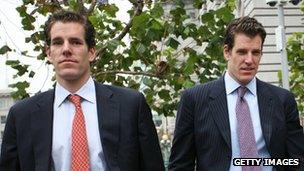Winklevoss twins plan $20m Bitcoin trust fund
- Published

Earlier this year, the Winklevoss twins said they owned about $11m of Bitcoins
Tyler and Cameron Winklevoss, famed for their legal dispute with Facebook's Mark Zuckerberg, have unveiled plans to float a Bitcoin trust.
The Winklevoss Bitcoin Trust will initially sell $20m (£13m) worth of shares to investors, according to a filing with the US regulators.
The twins are among the key backers of Bitcoin, a virtual currency traded independently of monetary authorities.
Its value jumped earlier this year, but has been highly volatile.
In January its value surged from $15 for each Bitcoin, to a high of $260 on 10 April, external, before crashing.
Bitcoins are now trading at a price of about $90 each.
Short-sellers
Like other currencies, Bitcoins are used to buy goods and services, with companies selling anything from software to online dating accepting it as payment.
The currency is created by the application of a mathematical formula in a process known as "Bitcoin mining".
A key feature of Bitcoins is that their supply can never exceed a certain number - 21 million - which has led some to speculate that their value may rise further.
In their filing with the, external US Securities and Exchange Commission (SEC), the twins said that shares in the trust were "designed for investors seeking a cost-effective and convenient means to gain exposure to Bitcoins with minimal credit risk".
The trust fund is to be listed on an as-yet-undetermined exchange - such as Nasdaq or the New York Stock Exchange.
The value of the fund is expected to track closely the value of the underlying Bitcoins in which it will be invested.
But - unlike with Bitcoins - the intention is that investors will be able to sell shares in the trust fund short, in effect allowing them to speculate that the value of Bitcoins will fall.
Earlier this year, the Winklevoss twins had told the New York Times that they owned about $11m of the virtual coins - about 1% of the global supply.
They have set up Math-Based Asset Services LLC which will be the sponsor of the trust.
The SEC filing warned that as "the sponsor and its management have no history of operating an investment vehicle like the Trust, their experience may be inadequate or unsuitable to manage the Trust".
- Published26 April 2013
- Published17 April 2013
- Published12 April 2013
- Published11 April 2013